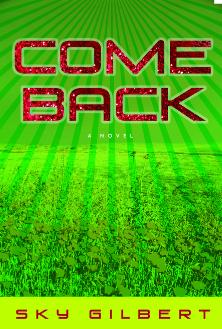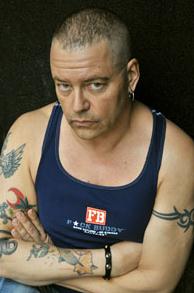
Credit: Xtra file photo
Toronto writer Sky Gilbert sets Come Back, his new novel, in a dystopia in the year 2050 in which a 138-year-old Judy Garland longs for her old addictions.
Unknowingly, the gay playwright and drag queen was writing about something close to home.
“Until Come Back was over, I didn’t realize how much it was about my struggles with addiction, alcohol and cigarettes mainly,” Gilbert says. “It also relates to my mother a little because my mother died of alcoholism.”
In the novel, Garland corresponds with her thesis advisor, expounding on stardom and gay life. In this way, Gilbert jams Come Back with radical ideas on an array of topics, including gay theory.
In 2050, everyone lives in a virtual cyberworld instead of reality. Machines keep Garland alive. Addled like most of the populace, she rarely leaves her home. When people do go out, they bear hideous physical alterations from living beyond their natural life spans. In using a sci-fi lens to critique our technology-addicted culture, Gilbert shares CanLit ground with Margaret Atwood, whose literary sci-fi novels, including Oryx and Crake, occur in dystopias caused by humankind running amok.
“I’m talking about our relationship to that [technological] world,” Gilbert says. “Like anything, you don’t blame technology; I think that human beings would find a way to fuck themselves, and have, without technology.”
His disenfranchised playwright, Dash King, the subject of Garland’s thesis, also runs amok failing to prove to academia that Shakespeare was gay. Sky used Dash to express frustrations about his failed attempts to write an academic paper on Shakespeare.
Dash, like Gilbert, is a sexual intellectual. This is how Gilbert describes himself and his Toronto housemates of the mid-to-late 1980s, when he roomed with Sue Golding at 67 Homewood Ave. She and another housemate were involved in the early years of The Body Politic, Xtra’s predecessor. His roommates proved to be radical, intelligent, promiscuous activists who expanded Gilbert’s intellectual vistas.
“They said, ‘You’re a slut’ and taught me how to love my ‘slutness’ and be intellectually informed, to understand intellectually what I was physically,” he says.
“That sort of ethos is gone,” Gilbert says, referring to gay culture, “except in older people like me and some younger ones who come back and discover it again because they’re just so frustrated with what’s out there.”
In Gilbert’s opinion, gay culture involves three elements: the first is gender play, the idea that femininity and masculinity can exist in equal parts in men and women and are explorable and enjoyable in both genders; a camp sensibility; and the idea of alternative relationships such as polyamory.
Gilbert opens Come Back with Garland rejecting gay culture, hoping to attract people who have also rejected it.
“Gay people are not really interested in . . . gay culture anymore,” Gilbert says. “The vast majority of gay men and lesbians have moved into this sort of marriage, religion, military thing.”
Such perspectives from Gilbert and Garland are oddly irresistible.
“It’s a really crazy novel about a Hollywood star, a gay icon who doesn’t want to be a gay icon,” Gilbert says.
Come Back
Sky Gilbert
ECW Press
$18.95
ecwpress.com


 Why you can trust Xtra
Why you can trust Xtra


